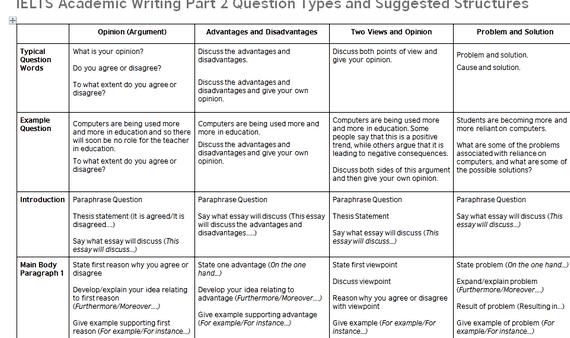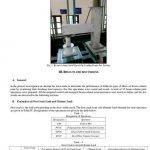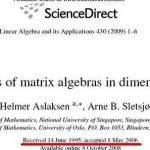Your IELTS Guide is completely independent, and not affiliated in any way to Cambridge ESOL, the British Council or IDP Australia.
The IELTS tips on this page will help you get the best possible score in the IELTS Writing test.
The tasks in the IELTS Writing module are different depending on whether you are doing the Academic or General Training format. However, most of these IELTS tips are relevant to both. Advice specific to a particular format is given later.
Time is the big enemy in the IELTS Writing test. You need to be able to manage your time very well if you are to complete both tasks to the best of your ability.
Task 1 accounts for one third of the marks and Task 2 the remaining two thirds. You should therefore spend 20 minutes on task 1 and 40 minutes on task 2. We don’t recommend spending more time on one at the expense of the other, even if you feel you can answer one more easily than the other. Answer both tasks to the best of your ability.
It isn’t important which task you do first. However, be sure to answer each task in the correct place. The answer sheet has “Task 1” and “Task 2” written on it in the appropriate place. Task 1 is on page 1 and Task 2 on page 3.
If you do accidentally answer a task in the wrong place make sure you mark it clearly and, if in doubt, inform the invigilator who will make a note of this. As long as it is clear to the examiner there will be no problem.
Read the instructions carefully. If you do not fulfill the requirements of the task you will be penalised. Allow yourself some time to plan your answer. You need a well planned, coherent answer to get good marks.
You must answer the task set. Be sure to read the entire task description carefully.
Quite often the introductory sentence will indicate what aspect of the topic is most relevant. Don’t misread it!
If you don’t respond to the topic, you will lose marks. If you don’t answer the task that is set, or include information that is irrelevant, you will lose marks. Don’t change the topic to something you are more familiar with (or have memorised). You will surely be disappointed!
You will not be given any rough paper so use the question sheet for notes and planning. Anything you write on the question paper will not be used for assessment.
You are required to write a minimum number of words – 150 for task 1 and 250 for task 2. If you write less than the minimum number you will be penalised. If you write more you will not be penalised but writing more may mean you don’t have time to complete the other task. Ideally you should try to write just over the minimum number for each task .
If you find you don’t have enough room on the answer paper to complete your script ask the invigilator for more paper. There is no requirement to fit your entire script on the answer paper supplied, though this is usually sufficient.
Don’t try to pad out your script by copying the rubrik from the question paper. If you do, it won’t be included in any word count made by the examiner.
Don’t try to memorise a ‘model’ answer before the test. It is unlikely that you will have a task on the same topic and scripts that are memorised or plagiarised are easily detected by the examiner and will be penalised.
Write clearly. Although you won’t be penalised for untidy writing, if the examiner can’t read your script it will be marked down. Poor spelling, however, will be penalised.
When writing your script remember that it will be marked by an examiner who is looking to see if you have fulfilled the requirements of the task, that your writing is coherent. that you can use the appropriate vocabulary and have a good range of sentence structures. The examiner will be looking to see how accurately you can manage these things.
Your examiner can only work with what he is given so do your best to provide him with a variety of language used accurately and appropriately to show what you are capable of.
If you finish both tasks before your time is up. don’t just sit there feeling smug! Use this time to check what you have written. While it is unlikely you will have time to make major changes to the content or layout of your essay, you should certainly spend the time proofreading. Check carefully for spelling, punctuation and grammatical errors. Inaccuracy in these areas will lose you marks so time spent proofreading is time well spent.
Academic Versus General Training
There are two versions of the writing test. The Academic format is aimed at candidates intending to go abroad to study at an undergraduate or postgraduate level. The Academic writing module is therefore used to assess whether the candidate is able to write in a way acceptable to academic institutions such as universities. The General Training writing module is aimed at the more basic survival requirements of candidates who want to emigrate, work abroad or study abroad but not at degree level.
Academic Writing
The Academic writing module is used to assess whether a candidate meets the more formal requirements of a higher education establishment. The tasks set and the requirements are therefore different to the General Training writing module.
The task will be to interpret a diagram or table and present the information in your own words. usually for a university lecturer. This may involve describing the information present or describing a process.
First spend a few minutes making sure you understand what the diagrams or tables show. What is it you see? You may be required to explain the data presented, possibly making comparisions. You may be required to explain how something works or describe the steps in a procedure or a sequence of events.
Once you have decided what the task involves by carefully reading the task description and looking at the diagrams/tables plan how you are going to answer it. You can use the question paper to make notes.
Your first paragraph should explain, in your own words, what the diagrams/tables show. Do not just regurgitate the task description. If you do it will be ignored by the examiner and not included in any word count. You therefore need to paraphrase what is in the task description .
Your following paragraphs should describe the data or process. You are explaining the information and drawing any conclusions that may be apparent from the data. Do not include opinions.
You mustwrite at least 150 words. Failure to do so will be penalised.
The second Academic writing task is designed to assess the candidate’s ability to discuss a problem, point of view or argument. The issues raised are of general interest and suitable for candidates entering higher education.
Read the task task description carefully. It is very easy to have an incomplete understanding of the topic. If so you will be marked down because you have not satisfied the requirements of the task.
Once you clearly understand the requirements of the task you must plan your essay. Use the question paper to do this. Introduce the topic in your own words. Do not copy the task from the question paper or it will be ignored and not included in the word count. You may be required to present an argument for or against a proposition, compare and contrast points of view, justify an opinion or evaluate evidence. End your essay with a conclusion .
You must write at least 250 words. Failure to do so will be penalised.
General Training Writing
The General Training writing test differs from the Academic version as it is aimed at assessing basic survival needs.
In task 1, General Training candidates are expected to write a letter as a response to a problem or requesting further information .
Read the task description carefully so that you understand what the letter is for. In particular, be sure to read the bullet points and include the information in the letter or you will not be fulfilling the task. Is this a formal or informal letter? To a friend or an organisation ?
You will be told to start your letter with “Dear. ” or “Dear Sir or Madam”, depending on the formaility of the letter. Please do as requested! (The ‘. ‘ can be replaced with a fictitious name.) These already give you a hint as to the tone of the letter. If you are told to start with “Dear Sir or Madam” the letter is clearly formal (and should end with “Yours faithfully”). If the letter is to “Dear. ” check from the rubrik whether it is to a friend or is more formal. If it is to a friend it is an informal letter so could be to “Dear John” and end in an informal way (not “Yours faithfully” or “Yours sincerely”). If it is a formal letter it could be to “Dear Mr. Smith” and should end with “Yours sincerely”.
The content of the letter should cover the task as specified in the task description. Be sure to cover all the bullet points and write the letter in the correct tone .
You must write at least 150 words. Failure to do so will be penalised.
In task 2 of the General Training writing module candidates are presented with a point of view, argument or problem .
Read the task description carefully so that you have a complete understanding of the task. If not you will be marked down because you have not satisfied the requirements of the task.
Once you clearly understand the requirements of the task you must plan your essay. Use the question paper to do this. Introduce the topic in your own words. Do not copy the task description from the question paper or it will be ignored and not included in the word count. You may be required to present an argument for or against a proposition, compare and contrast points of view, justify an opinion or evaluate evidence. End your essay with a conclusion .
You must write at least 250 words. Failure to do so will be penalised.
Use these IELTS tips to ensure you get the IELTS Writing score you deserve!
For information on how to prepare for the IELTS test, check out our IELTS Writing Preparation and IELTS Resources pages.
Print this page:
Your IELTS Guide is completely independent, and not affiliated in any way to Cambridge ESOL, the British Council or IDP Australia.
The IELTS tips on this page will help you get the best possible score in the IELTS Writing test.
The tasks in the IELTS Writing module are different depending on whether you are doing the Academic or General Training format. However, most of these IELTS tips are relevant to both. Advice specific to a particular format is given later.
Time is the big enemy in the IELTS Writing test. You need to be able to manage your time very well if you are to complete both tasks to the best of your ability.
Task 1 accounts for one third of the marks and Task 2 the remaining two thirds. You should therefore spend 20 minutes on task 1 and 40 minutes on task 2. We don’t recommend spending more time on one at the expense of the other, even if you feel you can answer one more easily than the other. Answer both tasks to the best of your ability.
It isn’t important which task you do first. However, be sure to answer each task in the correct place. The answer sheet has “Task 1” and “Task 2” written on it in the appropriate place. Task 1 is on page 1 and Task 2 on page 3.
If you do accidentally answer a task in the wrong place make sure you mark it clearly and, if in doubt, inform the invigilator who will make a note of this. As long as it is clear to the examiner there will be no problem.
Read the instructions carefully. If you do not fulfill the requirements of the task you will be penalised. Allow yourself some time to plan your answer. You need a well planned, coherent answer to get good marks.
You must answer the task set. Be sure to read the entire task description carefully. Quite often the introductory sentence will indicate what aspect of the topic is most relevant. Don’t misread it!
If you don’t respond to the topic, you will lose marks. If you don’t answer the task that is set, or include information that is irrelevant, you will lose marks. Don’t change the topic to something you are more familiar with (or have memorised). You will surely be disappointed!
You will not be given any rough paper so use the question sheet for notes and planning. Anything you write on the question paper will not be used for assessment.
You are required to write a minimum number of words – 150 for task 1 and 250 for task 2. If you write less than the minimum number you will be penalised. If you write more you will not be penalised but writing more may mean you don’t have time to complete the other task. Ideally you should try to write just over the minimum number for each task .
If you find you don’t have enough room on the answer paper to complete your script ask the invigilator for more paper. There is no requirement to fit your entire script on the answer paper supplied, though this is usually sufficient.
Don’t try to pad out your script by copying the rubrik from the question paper. If you do, it won’t be included in any word count made by the examiner.
Don’t try to memorise a ‘model’ answer before the test. It is unlikely that you will have a task on the same topic and scripts that are memorised or plagiarised are easily detected by the examiner and will be penalised.
Write clearly. Although you won’t be penalised for untidy writing, if the examiner can’t read your script it will be marked down. Poor spelling, however, will be penalised.
When writing your script remember that it will be marked by an examiner who is looking to see if you have fulfilled the requirements of the task, that your writing is coherent. that you can use the appropriate vocabulary and have a good range of sentence structures. The examiner will be looking to see how accurately you can manage these things.
Your examiner can only work with what he is given so do your best to provide him with a variety of language used accurately and appropriately to show what you are capable of.
If you finish both tasks before your time is up. don’t just sit there feeling smug! Use this time to check what you have written. While it is unlikely you will have time to make major changes to the content or layout of your essay, you should certainly spend the time proofreading. Check carefully for spelling, punctuation and grammatical errors. Inaccuracy in these areas will lose you marks so time spent proofreading is time well spent.
Academic Versus General Training
There are two versions of the writing test. The Academic format is aimed at candidates intending to go abroad to study at an undergraduate or postgraduate level. The Academic writing module is therefore used to assess whether the candidate is able to write in a way acceptable to academic institutions such as universities. The General Training writing module is aimed at the more basic survival requirements of candidates who want to emigrate, work abroad or study abroad but not at degree level.
Academic Writing
The Academic writing module is used to assess whether a candidate meets the more formal requirements of a higher education establishment. The tasks set and the requirements are therefore different to the General Training writing module.
The task will be to interpret a diagram or table and present the information in your own words. usually for a university lecturer. This may involve describing the information present or describing a process.
First spend a few minutes making sure you understand what the diagrams or tables show. What is it you see? You may be required to explain the data presented, possibly making comparisions. You may be required to explain how something works or describe the steps in a procedure or a sequence of events.
Once you have decided what the task involves by carefully reading the task description and looking at the diagrams/tables plan how you are going to answer it. You can use the question paper to make notes.
Your first paragraph should explain, in your own words, what the diagrams/tables show. Do not just regurgitate the task description. If you do it will be ignored by the examiner and not included in any word count. You therefore need to paraphrase what is in the task description .
Your following paragraphs should describe the data or process. You are explaining the information and drawing any conclusions that may be apparent from the data. Do not include opinions.
You mustwrite at least 150 words. Failure to do so will be penalised.
The second Academic writing task is designed to assess the candidate’s ability to discuss a problem, point of view or argument. The issues raised are of general interest and suitable for candidates entering higher education.
Read the task task description carefully. It is very easy to have an incomplete understanding of the topic. If so you will be marked down because you have not satisfied the requirements of the task.
Once you clearly understand the requirements of the task you must plan your essay. Use the question paper to do this. Introduce the topic in your own words. Do not copy the task from the question paper or it will be ignored and not included in the word count. You may be required to present an argument for or against a proposition, compare and contrast points of view, justify an opinion or evaluate evidence. End your essay with a conclusion .
You must write at least 250 words. Failure to do so will be penalised.
General Training Writing
The General Training writing test differs from the Academic version as it is aimed at assessing basic survival needs.
In task 1, General Training candidates are expected to write a letter as a response to a problem or requesting further information .
Read the task description carefully so that you understand what the letter is for. In particular, be sure to read the bullet points and include the information in the letter or you will not be fulfilling the task. Is this a formal or informal letter? To a friend or an organisation ?
You will be told to start your letter with “Dear. ” or “Dear Sir or Madam”, depending on the formaility of the letter. Please do as requested! (The ‘. ‘ can be replaced with a fictitious name.) These already give you a hint as to the tone of the letter. If you are told to start with “Dear Sir or Madam” the letter is clearly formal (and should end with “Yours faithfully”). If the letter is to “Dear. ” check from the rubrik whether it is to a friend or is more formal. If it is to a friend it is an informal letter so could be to “Dear John” and end in an informal way (not “Yours faithfully” or “Yours sincerely”). If it is a formal letter it could be to “Dear Mr. Smith” and should end with “Yours sincerely”.
The content of the letter should cover the task as specified in the task description. Be sure to cover all the bullet points and write the letter in the correct tone .
You must write at least 150 words. Failure to do so will be penalised.
In task 2 of the General Training writing module candidates are presented with a point of view, argument or problem .
Read the task description carefully so that you have a complete understanding of the task. If not you will be marked down because you have not satisfied the requirements of the task.
Once you clearly understand the requirements of the task you must plan your essay. Use the question paper to do this. Introduce the topic in your own words. Do not copy the task description from the question paper or it will be ignored and not included in the word count. You may be required to present an argument for or against a proposition, compare and contrast points of view, justify an opinion or evaluate evidence. End your essay with a conclusion .
You must write at least 250 words. Failure to do so will be penalised.
Use these IELTS tips to ensure you get the IELTS Writing score you deserve!
For information on how to prepare for the IELTS test, check out our IELTS Writing Preparation and IELTS Resources pages.
Print this page:





 List of topics for thesis writing
List of topics for thesis writing Beam column joint thesis proposal
Beam column joint thesis proposal Writing acknowledgements for thesis definition
Writing acknowledgements for thesis definition Kai wen lan thesis writing
Kai wen lan thesis writing Android locator map thesis writing
Android locator map thesis writing






